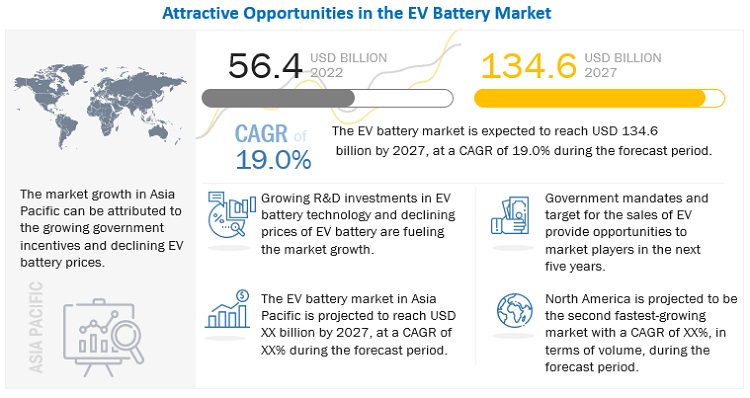EV Battery Market Booms with $134.6 Billion Worth by 2027
The global EV battery market is projected to grow at a CAGR of 19.0% from USD 56.4 billion in 2022 to USD 134.6 billion by 2027. The market for EV batteries is being driven by factors such as rising demand for electric vehicles, advancements in battery technology, favourable government policies and regulations, and the introduction of new plug-in EV models.
The growth of the EV battery market can be attributed to the increasing demand of electric vehicles, improvement in battery technology, supporting government policies and regulations, and launch of new plug-in EV models.
Asia pacific is expected to be the largest EV battery market in the forecast
China, Japan, India, South Korea, and Thailand are included in the Asia Pacific region when analysing markets. With a share of more than 95%, China is the biggest contributor to the global market. Chinese businesses including Panasonic, LG, Chem, Samsung, CATL, and BYD are in charge of the domestic and international EV battery markets, respectively. Due to their access to more affordable parts and materials, Chinese EV producers are able to provide their products at lower costs.
Download PDF Brochure @ https://www.marketsandmarkets.com/pdfdownloadNew.asp?id=100188347
With intentions for exports, China is likewise making large investments in the manufacturing of both commercial and passenger electric vehicles. To accommodate local demand, OEMs like BYD intend to establish factories in other continents to produce electric trucks and buses. The nation encourages the use of EVs by providing a subsidy for EV purchases. The nation is also enticing businesses to create better EV technologies, which will aid in EV batteries overall growth.
In May 2021, the Indian Government announced the Production Linked Incentive (PLI) Scheme National Program on Advanced Chemistry Cell (ACC) Battery Storage’ for achieving a manufacturing capacity of 50 GWh of ACC with an infrastructure funding of USD 35-40 million. 10 companies submitted their bid proposals under the “Advanced Chemistry Cell (ACC) Battery Storage Program in India. Specifically, Hyundai, Ola, Lucas-TVS, M&M, Amara Raja, Exide, Rajesh Exports, L&T, India Power Corporation, and Reliance New Energy Solar Limited have submitted their proposals.
With the advent of hybrid automobiles in recent years, South Korea and Japan began embracing electric vehicles. Toyota and Panasonic established a joint venture in October 2020 to start making hybrid vehicle batteries at a site in Japan. Mitsubishi, a Japanese producer, has declared that it will invest USD 9.6 million to increase electrolyte solution production for lithium-ion batteries in 2021. The corporation will utilise this money to modernise the machinery at its U.S., U.K., and Chinese manufacturing facilities.
The adoption of EVs in these nations has significantly increased because to developments in battery technology and targeted research.
Europe is expected to be the second largest market during the forecast
The governments of the European region are providing significant incentives to promote electric vehicles. As a result, the demand for electric vehicles has increased significantly. The region is home to manufacturers such as Renault, Audi, BMW, Mercedes, and others. Europe has set a very ambitious goal of reducing 80% CO2 emissions by 2030-2035 and has created a roadmap for the same. The governments of various countries in Europe are subsidizing electric vehicle infrastructure, and the focus is expected to continue to be on electric vehicles in the long run. In 2021, Europe witnessed high growth in the market with over 2.27 million EV sales, with a year-on-year growth of approximately 66% over 2020. In addition, the use of electric vans in the logistics sector of Europe is expected to bring opportunity for the EV battery market. Many leading logistics companies in Europe have started using electric vans for shipping and delivery purposes. For example, DHL, one of the leading logistics companies in the world, is using electric vans in some parts of the European region.
The lithium-ion battery segment is expected to be the during the forecast period
The lithium-ion battery dominates the EV battery market due to its high energy density, fast recharging capability, and high discharge power. As a result, lithium-ion batteries are the only available technology that is capable of fulfilling OEM requirements for developing electric vehicles with adequate drive range and fast charging. The cost of lithium-ion batteries is also a major factor driving its high demand since the decreasing cost of these battery types reached USD 130-140 /kWh in 2021 from around USD 800-900/kWh in the past years (Source: Multidisciplinary Digital Publishing Institute). Battery manufacturers are focusing on lithium-ion batteries and have invested in greenfield as well as capacity expansion projects to ramp-up production. For instance, CATL (China) plans to expand its production in Europe. the company plans to expand the production capacity of its Erfurt manufacturing site to 14GWh by the end of 2022 and 60GWh in 2026.
Key Market Players
The EV battery market comprises major companies such as players CATL (China), Panasonic Holdings Corporation (Japan), LG Chem (South Korea), BYD (China), and Samsung SDI (South Korea).
Request Free Sample Report @ https://www.marketsandmarkets.com/requestsampleNew.asp?id=100188347
Media Contact
Company Name: MarketsandMarkets™ Research Private Ltd.
Contact Person: Mr. Aashish Mehra
Email: Send Email
Phone: 18886006441
Address:630 Dundee Road Suite 430
City: Northbrook
State: IL 60062
Country: United States
Website: https://www.marketsandmarkets.com/Market-Reports/electric-vehicle-battery-market-100188347.html


